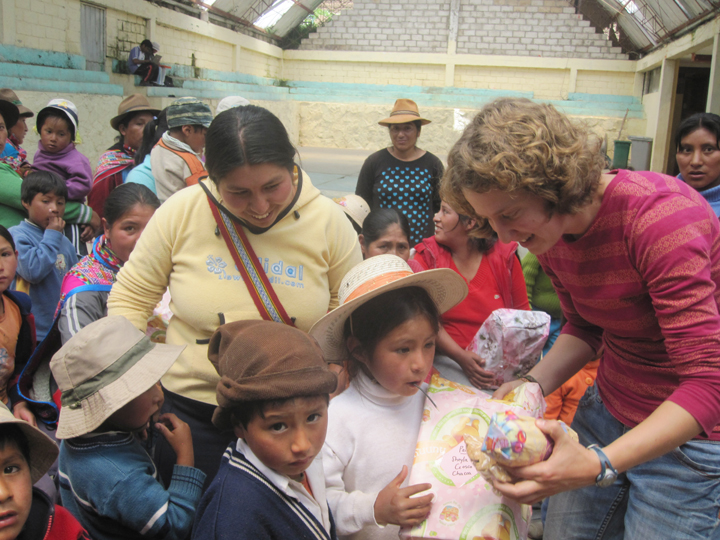Courtesy Eastern Mennonite Missions, Mennonite Weekly Review
Mary Dunn and her Eastern Mennonite Missions (EMM) team recently took a break from clinics and lessons about nutrition and sanitation to distribute something just as important — sweets and gifts.
Much of Dunn’s ministry involves working with a Peruvian Mennonite Church team that holds clinics and teaches in remote Andean villages. On a recent visit to Cotabambas the team treated more than 30 children, many with serious respiratory infections.
But in December their visits took on a new flavor — chocolate.
“God is constantly teaching me about the blessing of both giving and receiving,” said Dunn, a nurse from Kidron, Ohio, as she wrapped up her yearlong internship with EMM.
Before going into the countryside, Dunn and Juana Puma, her Peruvian co-worker, purchased 44 pounds of sugar, enough to prepare hot chocolate and sweet bread for more than 200 people.
They also wrapped gifts for the children in Cotabambas, where they were completing a yearlong children’s nutrition program, and prepared teaching materials for the two churches they were visiting — San Juan de Cotabambas and Colca.
Sugary treats are not usually part of the health teachings or the diet of the Quechua villagers, but Dunn said seeing the smiles on the children’s faces was priceless.
On these visits, in addition to the health classes, the church team threw “Chocolatadas,” a festive event with hot chocolate with sweet bread. In some locations they also shared gifts of basic food staples.
The Chocolatadas also included devotional times and festive worship singing. Dunn was surprised to get pressed into sharing an impromptu sermon.
“I never imagined doing something like that,” Dunn said. “I was put in a position of needing to completely rely on God. I spoke in Spanish while my friend Gloria translated into Quechua because most people in the country churches understand that better.
“I had expected to be giving gifts, but was surprised by the goodness, generosity and faithfulness of God expressed back to us by the hospitality of the villagers. Their warm fellowship was such a gift — helping us sense God’s love and presence.”
In San Juan de Cotabambas, before the Chocolatada celebrations, the villagers insisted on serving their visitors soup. Another village hosted the visiting team of six overnight, fixing breakfast over an open fire.
During her internship working in the “campo” (countryside) Dunn has enjoyed seeing how the villagers regularly bring their gifts and offerings to the church.
Often there is no money in the offering plate, but people heap corn in the front of the church. Someone may bring a chicken or a guinea pig.
Dunn witnessed her first Peruvian baptisms. The church is continuing to spread, especially in the remote mountain regions. She had an unforgettable moment when she witnessed 10 people committing their lives to Christ — with the Andes Mountains in the background.
Dunn has been pleased to meet women dedicated to what they are learning in health classes and making changes in their lifestyles. Many are integrating more vegetables into the family diet. Others are installing latrines.
The health team has the goal of visiting each of the 13 Mennonite churches that have been established in and around Cusco.
Dunn said the villagers often say things like, “Thanks for coming, for remembering us. We often feel forgotten and neglected way out here.”
